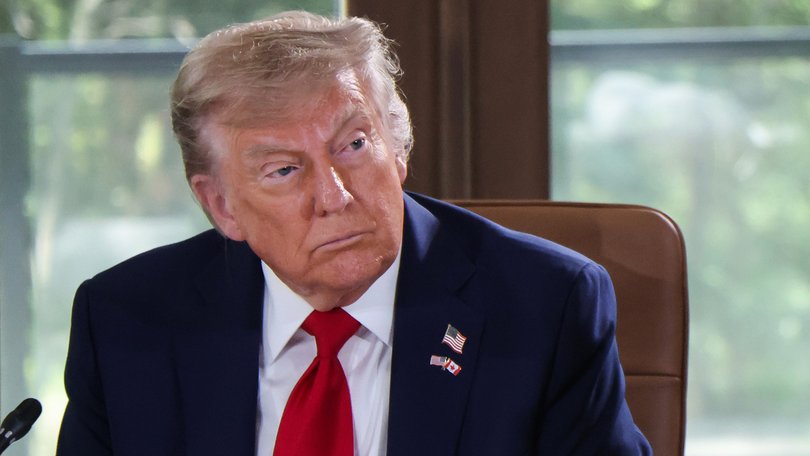Australian news and politics recap June 17: Trump wants a ‘real end’ to Israel-Iran conflict ‘not a ceasefire’
LIVE UPDATES: US President Donald Trump has told reporters on Air Force One that he’s looking at something ‘better than a ceasefire’ for Israel and Iran.

Scroll down for the latest news and updates.
Key events
17 Jun 2025 - 05:57 PM
‘If they want to talk, they know how to reach me’: Trump on Iran
17 Jun 2025 - 05:41 PM
Trump: ‘We’re looking at better than a ceasefire’
17 Jun 2025 - 03:18 PM
Israel edges closer to Iran’s Supreme Leader as military commander killed
17 Jun 2025 - 02:56 PM
Power grab amid conflict amps up fears over energy security
17 Jun 2025 - 02:02 PM
Trump says Macron has ‘no idea’ and denies Middle East ceasefire negotiations
17 Jun 2025 - 11:50 AM
Macron confirms Israel, Iran ceasefire deal being negotiated by US
17 Jun 2025 - 10:07 AM
US denies it is assisting Israel with strikes on Iran
17 Jun 2025 - 09:23 AM
Office of Australia PM says cancellation of meeting ‘understandable’ given conflict
17 Jun 2025 - 09:18 AM
Chalmers not surprised Albo-Trump meeting cancelled
17 Jun 2025 - 09:05 AM
Trump ‘wished” he could stay another day in Canada
17 Jun 2025 - 09:03 AM
Coalition demands new plan for PM, Trump meeting
17 Jun 2025 - 08:41 AM
White House preparing situation room for Trump return
17 Jun 2025 - 07:42 AM
Donald Trump leaves G7 early due to Middle East conflict
PM speaking now from Canada after Korea, NATO bilats
Prime Minister Anthony Albanese has just wrapped up separate bilateral meetings with the leaders of South Korea and NATO and is now holding a press conference in Calgary, Canada.
On his meeting with Korean President Lee Jae-myung, Mr Albanese said it reinforced how significant an economic, energy, and defence and security partnership Australia and South Korea shared.
Mr Albanese said of his meeting with NATO Secretary-General Mark Rutte the pair had discussed the security relationship in Europe and the ongoing impact of Russia’s invasion of Ukraine.
The PM said he relayed to Mr Rutte that Australia would be open to considering participating in any future coalition of the willing, as has been proposed by French and British leaders, contingent on a peaceful resolution in Ukraine.
NATO flags Australia can do more in defence industry production
NATO boss Mark Rutte has flagged it could do more with Australia when it comes to defence and production.
Mr Rutte commended Mr Albanese for his “leadership” on Ukraine and his willingness to help from afar.
“I want to thank you for your leadership on Ukraine. It is really important. So far away, yet so close.
“I also want to thank you for always understanding the closeness when it comes to the defence industry and production.
“Something we can really do more as NATO with our Indo-Pacific partners.”
Australia ‘crucial’ to NATO during ‘interconnected’ conflict: Rutte
Prime Minister Anthony Albanese has met with NATO Secretary General Mark Rutte in Kananaskis, Canada, on the sidelines of the G7 summit.
“We remain friends, whilst not members, of course, of NATO,” Mr Albanese said.
“I think the democratic world needs to defend our values and we are seeing that play out.
Mr Rutte thanked Mr Albanese for the meeting and congratulated him on his recent election win before discussing Ukraine and Australia’s importance.
“It is not Russia alone. It is Russia with North Korea, with China, even Iran,” Mr Rutte said. “It is all getting more interconnected.”
Mr Rutte said NATO working with Japan, New Zealand and Australia is “really crucial”.
Trump reportedly refuses to sign Iran-Israel de-escalation G7 statement
US President Donald Trump has indicated he will not sign a joint G7 statement calling for de-escalation between Israel and Iran.
It is understood that a draft statement, led by European leaders, was presented, with the US President refusing to sign.
“Under the strong leadership of President Trump, the United States is back to leading the effort to restore peace around the world. President Trump will continue to work towards ensuring Iran cannot obtain a nuclear weapon,” a White House official told CNN, adding he had no reason to sign the document yet.
A Canadian official said there was still time to try and get the joint statement signed.
“This is not a done deal yet, this is something that will be discussed at the leader level. We expect that the bulk of that conversation will happen in the global security session this evening,” they told the outlet.
PM seeks ‘certainty’ as he prepares for Trump tariff talks
Australia is looking for certainty from its partners as the Prime Minister’s impending discussion with US President Donald Trump looms large.
Anthony Albanese will continue meeting with world leaders on the sidelines of the G7 summit when he holds talks with the newly-elected South Korean President Lee Jae-myung and North Atlantic Treaty Organisation secretary general Mark Rutte in Canada on Monday local time (Tuesday AEST).
Though Australia is not a member of the G7, Mr Albanese was invited to the event in Kananaskis by Canadian Prime Minister Mark Carney.
He has taken the opportunity to build rapport with other nations as Mr Trump’s tariffs cast a shadow over the global trade.
“What’s clear is that in (an) uncertain world, what people are looking for is certainty in relationships, trusted relationships,” Mr Albanese told reporters.
‘Challenging’: Grim outlook for Aussies stranded in Middle East
The Australian Government says it will be “challenging” to get Aussies out of Israel as conflict with Iran continues to unfold.
“Well, the air zone is closed,” Defence Industry Minister Pat Conroy told ABC RN on Tuesday.
Mr Conroy said even when airspace is opened, “It’s going to be challenging”.
“There’ll be a lot of people probably wanting to exit, so we have to be careful, but we’re in contact with as many people as possible.
“The DFAT team at the crisis centre are doing great work.”

